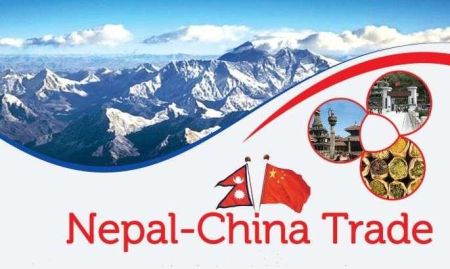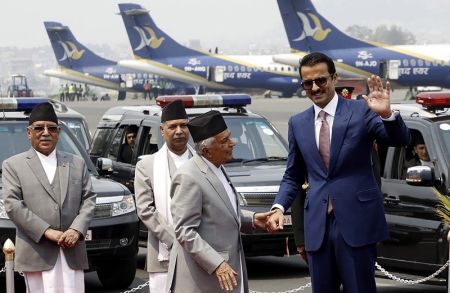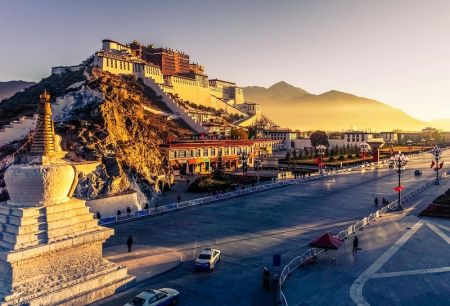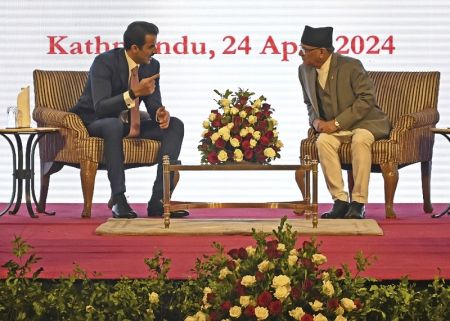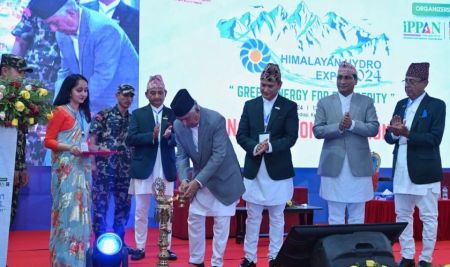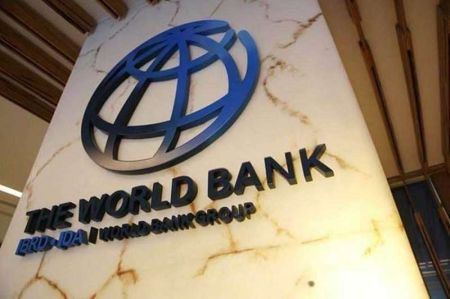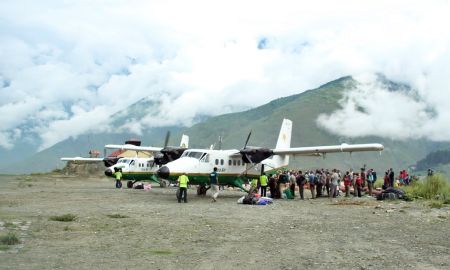.jpg)
--By Achyut Wagle
The Communist Party of Nepal-United Marxist-Leninist (CPN-UML) passed yet another acid test to vindicate its democratic credentials by electing the entire 159-member Central Committee (CC), including the new chairman through ballots, in the ninth general convention (GC) held in Kathmandu, July 3-10, 2014. In a closely contested bid to chairmanship, KP Sharma Oli defeated Party's former, two-time, general secretary Madhav Kumar Nepal by a narrow margin of forty-four out of two thousand and two hundred votes of the GC delegates.
Democratic Domain
There is no dearth of cynics who claim that bitter factionalism that surfaced during the contest for chairmanship would further divide the party that is already mired by groupism. But what must be appreciated here is: UML is the only political party of the country that has developed best internal democratic practices. Unlike many communist outfits who choose to break-away as the separate entity once some differences crop-up within the group, the UML has exhibited tremendous level of resilience to save it from fragmentation; thanks to the democratic space it created to vent the differing views and ideologies. For this reason it has withstood the test of time as the mainstream left force amongst some three dozen odd communist 'parties'. It must not also be forgotten that it is a communist party that has painstakingly and by now convincingly transformed itself to a credible democratic alternative of the country. More importantly, it has set a practical contemporaneous formula for democratic transformation of any communist force that is originally indoctrinated to rise to power of 'people's republic' by using the 'bullets and barrels'to a force that readies itself to multi-party competition through ballots. No doubt, for this party, metamorphosis of greater magnitude is still inevitable to shake-off many dogmas and nostalgia of Soviet era. But, whatever it has achieved and maintained itself is in no way instantly dismissive. The ninth GC too has proved to be a new milestone as it elected mainly new set of younger leaders in CC, who have firmer belief in democracy than the older generation.
It is not difficult to see that the Party's polity has now shifted from 'Proletarianism' or 'Leninism' to Panelism, which from a democratic perspective is a welcome dimension of change. The political sportsmanship and democratic spirit was clearly demonstrated by the leaders at the official closing ceremony of the GC on July 17. Both the victor and vanquished, Oli and Nepal respectively, along with other elected central body members vowed to work for the party unity, terming the vertical division during the CC election mere 'democratic exercise'. Not only both the factions won equal number of members as the office-bearers, the representatives seem to have guided to votemore by the quality of the candidate than the factional affiliation, electing a completely mixed panel. Any 'bright' person from both panels got place in the new CC.
Road Ahead
If the mood of the Declaration made at the UML headquarters on 17th of July, is any indication, the party would soon enter into an era of a joint-leadership of many influential leaders. The chairman-elect Oli in very clear terms, with tears in his swollen eyes, declared that he did not have many days to live, and extended his arms for unity. It was momentarily a piece of emotional melodrama, unique to political cruelty. He couldn't even complete his short written speech. It is his eighth year running since his kidney transplant and, of late, the infection has now spread to his whole body, with septic deep wounds and swellings. There was a whirling question in the minds of the entire rank and file, why did he at the first place choose to run for chairmanship despite such precarious health condition? There is a strong school of thought which believes, there were mischievous minds like that of Bamdev Gautam who harboured dream of running the party as officiating chief as Oli is already a dilapidated figure. But, this possibility is clearly thwarted by the 'ideologues' belonging mainly to Nepal faction, who changed the party statute such that now there are five second men (vice-chairmen) in the hierarchy after the chairman. This is the very statute the GC ratified, albeit with some resistance. And, incidentally, Gautam ranked second among these five in terms of popular vote, behind Bhim Rawal, a Nepal loyalist. In any event of Oli's absence, there would be moral pressure (as there is no clear statutory provision) to handover charges to Rawal, not Gautam, or Bidya Bhandari, another vice-chair elect and the most trusted aid of Oli.
What the UML's change in leadership means for the nation, is another issue widely debated in the political circles after Oli’s victory. Again, effectively it depends on the health of Oli. Should his health permit, he naturally dreams of becoming the next prime minister of the country. If the things move according to agreement between the Nepali Congress and UML to promulgate a new constitution by the end of January 2015, under the turn-key clause of the agreement, the premiership would automatically come to the UML candidate, as things stand now, to Oli as the Party's parliamentary party leader. There are newly emerged political equations within that party such that no single person, except the chairman given his current level of comfortable majority in CC, is likely to hold the sway in any decisions. The ambitions like that of Gautam are dampened as such, once the power gets transferred to lower ranks from the chairman.
Policy Paradigm
During the run-up to the ninth convention, there was a sort of euphoria created by a 'club' of party's young 'thinkers' that Party's socio-politico-economic policy paradigm would be redefined and formalized through the GC. But, the entire GC was so much consumed by the fight for the posts that it hardly could undertake much deserved discussions with due seriousness on any policy document. At the end, when it came-out with the thirty-three point Declaration on July 17, many of the same old communist verbose again found the place in it. 'Awarding land-ownership rights to tillers', 'protecting trade union rights', 'deploring of infringements on human rights' in some weird part of the world etc. were repeated, rather artlessly. Some of the hasty conclusions like the 'global economic crisis like that of 2008 justifies the rationale of socialism' were also incorporated.
Interestingly though, this Declaration has very carefully avoided over use of redundant communist jargons and jingoisms. Not only it doesn't carry terms like 'Indian expansionism', 'American imperialism', it also cautiously reduces the frequency of the words like 'revolution', 'struggle' or 'class struggle' that are invariably and clumsily thrusted into policy papers of almost all communist formations. The ninth GC Declaration instead proposes interesting separate economic prescriptions for their cadres and the country.
'This GC urges all the local committees of the party, affiliated sister organizations and all members of the party to devise concrete plans for their respective locality to augment economic development, productivity and employment and involve in the production functions so as to establish themselves as the leading-lights of the economicprosperity,' says the point number 23 of the Declaration. The Declaration has also 'appreciated' the 'improving' relations between India and China and has wished to make Nepal beneficiary to the impressive economic growth of both the neighbours.
Opportunities and Challenges
Perhaps the biggest opportunity for the CPN-UML is the growing compulsion for all other communist forces to follow its 'janatako bhudaliya janbad' or multiparty democracy route, should they opt to remain relevant in modern day pluralistic politics. It is becoming increasingly difficult for parties with Maoist tags not to follow the exact process the UML did for the last two and half decades. If the party wereto equip itself to harness this opportunity, it could provide a major fillip to its organizational strength. Certainly, its increasing global recognition as trustworthy democratic force is another very powerful factor that helps to retain it as a major player in Nepali politics. Its gradual policy shift from Left to the Centre is crucial to ensure the outfit's long lasting relevance.
There are challenges too, mostly emanated from three sources - policy confusions, organizational efficiency and 'class' shifts. The ninth GC also could not change its name by dropping the 'Marxist-Leninist' tag and the term 'Communist' from its official name, despite the fact that there is a widespread realization of this need within the Party. The psychological divide in the mandarins is debilitating -- they often times love to retain communist identity and yet want to change this 'as soon as possible' for public interface. The Party has failed to bring into effect a much-needed departure from three the decade-old nostalgia of 'classless society'. Instead the Party itself has become the 'class' of riches with 'too many, too big' leaders. The only reason the Party substantially increased the number of office bearers from six to fourteen was to accommodate these 'big' names with suitably high-sounding positions. Generally, those who have been prime ministers, deputy prime ministers and ministers in the past have sought those 'elitist' titles. This is resulting into overlaps and duplications on responsibilities and duties, and ego clashes at every decision points. The cumulative effect of all these is sure to have telling effect in organizational efficiency and cadre-leader relations, not in so distant future.
Effectively, the UML has graduated from the party of 'proletariats' to 'new riches', not only in terms of policy-base but as the class representation. To borrow a phrase from the communist literature itself, 'the class division' within the party has been strikingly vivid in recent years. In many cases, its leaders have protected criminals just to extract money in return. There is not any binding ideology available in any political literature that can accommodate all these extremes. The task of managing all these paradoxes, the sooner the better, comes on the shoulder of the new leadership. But, unfortunately, the shoulders of the commander are now sick, severely.
The writer is former editor of Aarthik Abhiyan National Daily.






